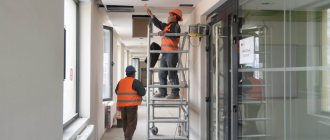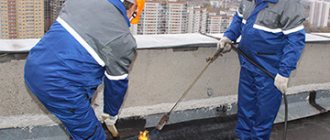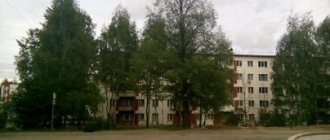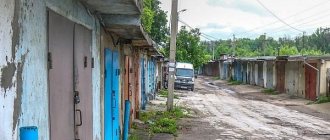General information from this law
There was real confusion in the housing sector until December 2012. Many citizens are accustomed to the fact that major repairs are carried out by the state , while others have long paid for the modernization of their apartment building from their own funds (read how legal such fees for major repairs are here, and from this material you will find out whether such contributions were declared illegal by the Constitutional Court and the Prosecutor General's Office of the Russian Federation ).
In December 2012, the Government of our country adopted Law No. 271 - Federal Law on Major Repairs - and signed by the President of the country. This regulatory act not only introduced a grain of reason into the Housing Code, which had been confusing up to this point, but also contained some innovations. You can learn more about the innovations that have been introduced into the legislation regarding major repairs recently from a separate publication, and if there is a law in the Russian Federation regulating the procedure for carrying out major repairs, read here.
This regulatory act was called the Federal Law on Amendments to the Housing Code of the country, as well as some other regulations No. 271 of December 25, 2012. The Federal Law on Payment for Major Repairs conveys information that citizens are required to pay their own fees for major repairs . Before this, no law had ever regulated this item.
In addition, now the Federal Law on the exemption of fees for major repairs has also acquired a list of persons who, to one degree or another, are fully or partially exempt from payments . Until the release of Law 271 on capital repairs, the categories of beneficiaries were not clearly defined, and this issue remained under regional rather than federal jurisdiction.
The new regulatory legal act has become a kind of code that contains all the nuances of implementation and preparation for major repairs. It is curious that the Federal Law on the payment of contributions for major repairs, at the official level, allowed the regions to independently set the cost of the contribution for each square meter of real estate.
Reference: cities of federal significance (Moscow and St. Petersburg) must pay amounts slightly higher than other settlements of regional or district significance.
The reaction of citizens to this regulatory act was ambiguous. Someone was glad that the time of arbitrariness on the part of unscrupulous owners and employees of management organizations would finally end and the repairs would be carried out not only in accordance with the deadlines, but also in accordance with the regulations. Some, on the contrary, were outraged by the legally established obligation to pay contributions without fail .
Some did not like the inflated prices for tariffs in comparison with other regions, and others were horrified by the established sanctions for non-payment (Article 155). One way or another, Federal Law 271 - the Federal Law on Major Repairs, did not leave anyone indifferent, however, its individual articles deserve close attention.
However, this normative act cannot cover all issues related to overhaul. Thus, issues related to the formation of the fund relate to Law 185 on capital repairs. The nuances of carrying out major repairs and the selection of personnel to carry out the work are not related to the maintenance of these acts. However, to do this, you can refer to the Federal Law and, by placing a tender, select the most profitable supplier of services and materials.
Description of the law
The entry into force of Law No. 271-FZ established the rules for the production and payment of repairs in residential apartment buildings. At the same time, it acts not as an independent legislative act, but as an addition to the Housing Code of the Russian Federation, clarifying its provisions.
Responsibility for the technical condition of common property, including payment for current and major repairs, rests with the residents.
Housing Code of the Russian Federation Article 170 “Capital Repair Fund and Methods for Forming this Fund” - regulates the contributions paid by the owners of the premises of an apartment building.
What are current and major repairs?
They are divided based on the list of works. The current one is carried out as planned to partially restore the serviceability or operability of the house, it implies:
Dear readers! To solve your problem right now, get a free consultation
— contact the lawyer on duty in the online chat on the right or call: +7 (499) 938 6124 — Moscow and region.
+7 (812) 425 6761 — St. Petersburg and region. 8 (800) 350 8362 - Other regions of the Russian Federation You will not need to waste your time and nerves
- an experienced lawyer will solve all your problems!
- jointing and sealing seams and cracks;
- restoration of wall cladding and foundation;
- restoration of waterproofing;
- ventilation repair;
- reworking individual sections of brickwork;
- elimination of cracks in the cladding of walls, facades, stairs;
- replacing unusable steps, strengthening railings.
A major overhaul is carried out to eliminate malfunctions of worn-out structural elements of common property, restore them or replace them to improve operational characteristics. Involves the following work:
- updating parts of the roof, basement, utility rooms, facades, elevators that are not suitable for further use;
- restoration of the foundation of a residential building;
- repair of electrical and sewerage communications;
- equipping the home with meters for metering consumed resources.
What does the law say?
Federal Law on major repairs of apartment buildings 271
The adoption by the State Duma of this Federal Law was the beginning of the creation of a legal basis for the implementation of capital repair mechanisms in all regions of our country.
The main innovation in this act was the assignment of responsibilities for financing these works to the owners of premises in an apartment building.
Thus, Article 170 of this law states that the capital repair fund is formed by contributions from owners commensurate with the size of the property. Unfortunately, the law does not provide for amendments regarding liability for failure to carry out major repairs for owners and government agencies. But more than half of our country’s housing stock needs work.
It is important that the amendments made to Article 166 have now finally clarified the situation in terms of what specific work is included in the overhaul . Residents can familiarize themselves with the list and check for themselves how well the repair work has been carried out. What if you don’t pay for major repairs under Law 271? Despite all of the above, responsibility for the maintenance of housing in an apartment building lies with the owners in accordance with Article 158 of the Housing Code.
Overhaul according to Federal Law 185
Federal Law 185 on capital repairs of apartment buildings dated July 21, 2007 talks about exactly how the capital repair fund is formed, how it is opened, and also which structures can be entrusted with this action.
This regulatory act is a kind of manual for homeowners in an apartment building, which will tell you how to act after the delivery of the house when opening a fund for major repairs. It is useful for residents to know not only how this fund is formed, but also how specific checks and reporting on spent funds are carried out (Article 13 of the law).
In addition, it is important for residents to know that if they are in line to receive major repairs in their home, they can count on subsidies from the state. There are a number of state and regional programs that help citizens obtain additional funds for modernizing premises. This regulatory act, namely Article 20, describes the nature of subsidies, as well as the method of receiving them.
Major repairs according to 44 Federal Laws
Federal Law No. 44 of April 5, 2013 is considered the main regulatory act in the field of government contracts and procurement.
It is there that tenders are awarded and suppliers of various materials and services offer their services.
Many government organizations, including administrations and management companies formed by homeowners' associations, resort to this law in order to carry out major repairs in the most profitable manner.
This regulatory act talks about how to become a procurement participant, how to form tenders, select suppliers and what requirements your orders must meet. This law also describes the nuances of various types of procurement (Article 108 of the law).
Important! If you are new to the procurement field, you can first familiarize yourself with the general provisions , which will reveal to you the meaning of this process.
On our website you can also find out in more detail how the law regulates issues related to major repairs, what is said regarding this in the decisions of the Government, the Supreme Court and the Constitutional Court of the Russian Federation, and whether it is possible in court not to pay contributions for major repairs.
New rules for paying for major repairs in an apartment building
The original article was taken from the website Clerk.ru
Currently, according to the most conservative estimates, a third of apartment buildings (MKD) in the Russian Federation are worn out and require major repairs.
Major repairs of an apartment building - carrying out work to eliminate malfunctions of worn-out structural elements of the common property of the owners of premises in an apartment building, including their restoration or replacement, in order to improve the operational characteristics of the common property in an apartment building.
Before the entry into force of the Federal Law of the Russian Federation of December 25, 2012 No. 271-FZ “On amendments to the Housing Code of the Russian Federation and certain legislative acts of the Russian Federation and the recognition as invalid of certain provisions of legislative acts of the Russian Federation” (hereinafter referred to as Law No. 271-FZ), major repairs helped implement the housing and communal services reform fund. Now the fund will only sponsor the relocation of citizens from dilapidated and dilapidated housing. After Law No. 271-FZ comes into force, owners of living space in apartment buildings will pay for major repairs. Payments for major repairs are mandatory. The monthly fee in each region is set separately and will vary from 5 to 7 rubles per square meter.
By 2014, local governments are required to create a capital repair fund and appoint a regional operator who will repair the housing stock and promptly publish information on the condition of the houses being repaired on the Internet.
At first glance, everything is very clear, moreover, in some regions, even before the adoption of this law, owners paid for major repairs of residential buildings, but around this document there are a lot of speculations and rumors about how this money will be collected and spent. Next, we will consider the pros and cons of Law No. 271-FZ, its innovations, and how this will affect the wallets of ordinary citizens.
The new law, in fact, did not introduce a new norm into civil law, since the Civil Code of the Russian Federation (Article 210) and the Housing Code of the Russian Federation (Clause 1, Article 158) clearly states: responsibility for the maintenance of owned housing lies with its owners. In other words, a person who has purchased, privatized or otherwise acquired ownership of an apartment in an apartment building receives not only the rights, but also the responsibilities for maintaining the housing in proper condition (repairing the roof, facade, foundation, etc.).
Law No. 271-FZ, recognizing the payment for major repairs as mandatory for all owners, is aimed at creating a clear mechanism that will allow major repairs of the entire housing stock to be carried out as planned.
According to Rosstat, at the end of 2011 in the Russian Federation there were 20.5 million square meters of emergency housing, as well as almost 80 million of “dilapidated” housing. The share of such dwellings in the total housing stock is 3%. According to unofficial data, approximately the same number are actually emergency, but are not recognized as such, because Local budgets simply do not have the funds to resettle residents from such houses. The amount required to bring the housing stock into proper condition is unaffordable for the budget. It makes sense that owners will fulfill their statutory duty to maintain their property.
But, given the unpleasant pattern when money disappears or is used for other purposes, citizens need guarantees that these funds will not be stolen and will be used for the purposes for which they were collected. Law No. 271-FZ solves this problem as follows:
Option 1: by the end of 2013, the regions of the Russian Federation must create a capital repair fund and establish a state enterprise - a regional operator. The regional operator will carry out major repairs using funds that will go to the fund according to a plan that will include every apartment building in a constituent entity of the Russian Federation. Local government bodies will compile such lists. The registers will be publicly available, and every citizen will be able to monitor the progress of the repair queue. Each region will have its own fee for residents, but the federal and regional budgets will co-finance capital repairs.
This fundraising option actually contradicts the Civil Code of the Russian Federation and the Constitution of the Russian Federation. As noted above, the owner bears the burden of maintaining his own property, but not that of others. As a general rule, officials allow the funds collected from one house to be used for major repairs of another, according to the approved schedule. One can only guess how the queue will be formed, and who will receive assistance first, and whose house will be repaired in 10 years;
Option 2: The HOA has the right to open its own special account to which the owners will transfer contributions for capital repairs in order to form a capital repair fund. In this case, funds from such an account can only be used for major repairs and for nothing else.
If the Management Company arbitrarily increases the amount of the contribution for major repairs, the owners can go to court to protect their interests.
Let's consider an example: The decision of the Salavat City Court of the Republic of Bashkortostan.
From the case materials: Plaintiff I.A.P. filed a claim against Zhilkomzakazchik LLC, motivating her demands as follows: Maintenance of the house in which she is the owner of the apartment is carried out by the management organization Zhilkomzakazchik LLC (UK).
Despite the fact that the general meeting of homeowners did not make a decision to carry out major repairs of the house, the amount of contributions was not established, and there were no proposals from the management company on the timing of major repairs, the management company charges a fee for major repairs of the house.
The plaintiff repeatedly appealed to the management company with a request to stop accrual under this article, however, in violation of the requirements of Art. 44 and 158 of the Housing Code of the Russian Federation and in the absence of any other decision of the owners of residential premises located in house No., the Criminal Code continued to charge and withhold fees under the article “major repairs” for residents of the specified house.
The plaintiff asks to recognize the actions of the Management Company in charging fees for major repairs as illegal and to oblige the Management Company to stop charging under this article and to pay the plaintiff in cash or by transfer to a bank account the overpaid amounts for major repairs.
The court, having listened to the participants in the process and examined the case materials, considers the statement of claim I.A.P. subject to partial satisfaction on the following grounds:
Making a decision on the repair of common property of homeowners in an apartment building is referred by Article 44 of the Housing Code of the Russian Federation to the competence of the general meeting of homeowners.
As established by the court, the plaintiff entered into an agreement for the management of an apartment building with the management company, under the terms of which the management organization undertakes to provide a range of works and services for the management of an apartment building, including the provision of services and work on the proper maintenance and repair of common property, the provision of utilities to the owner and its users premises for persons. Clause 4.9 of the Management Agreement provides for an indication in the payment document issued by the Managing Organization as part of the accrued payment for residential premises of the fee for major repairs of the common property of the owners of residential premises in an apartment building, subject to the adoption at a general meeting of the owners of premises in an apartment building of a decision to carry out major repairs of the common property of the owners in accordance with Art. 44 and 158 Housing Code of the Russian Federation. According to clause 4.18 of the Management Agreement, major repairs of common property in an apartment building are carried out at the expense of the owner on the basis of an additional agreement to the agreement, prepared on the basis of a decision of the general meeting of premises owners.
The defendant did not provide evidence that the owners of the premises of the apartment building (address) made a decision at the general meeting on the timing of the major repairs of the apartment building and on payment of the costs of the major repairs. In violation of the terms of clause 4.18 of the Management Agreement, an additional agreement to carry out major repairs was not concluded.
The roof repairs carried out do not provide grounds for collecting these funds from homeowners through monthly collection of funds, since there is no evidence of approval at the general meeting of owners of the estimate and payment procedure for this work. Thus, the defendant violated the provisions of Part 2 of Art. 158 of the Housing Code of the Russian Federation, the defendant had no grounds for collecting fees from the owners of residential premises in an apartment building for major repairs.
The minutes of the general meeting of house owners confirmed the establishment of the amount of fees for the maintenance and repair of residential premises, which includes fees for services and work on managing apartment buildings, maintenance, current and major repairs of common property. However, from the receipts presented by the plaintiff and the extract from the personal account presented by the defendant, it follows that along with the accrual of fees for the maintenance of housing, the plaintiff was charged for major repairs on a separate line in the amount of N rubles, which contradicts the decision of the general meeting presented by the defendant.
Under such circumstances, the plaintiff’s demands regarding the illegality of the defendant’s establishment of fees for major repairs to the plaintiff and the recalculation of fees should be recognized as justified, which should be satisfied within the limits of the plaintiffs’ demand.
Conclusion: the second option is preferable. First of all, major repairs are not tied to the plan established by officials, therefore, it can be done earlier than in the queue. In addition, the owners themselves set the amount of monthly contributions (the amount of the monthly contribution for capital repairs should not be less than the minimum contribution for capital repairs established by the regulatory legal act of the constituent entity of the Russian Federation). Repair work is carried out by the management company or any other organization at the discretion of the owners. The bank will transfer the money to the contractor only after the owner of the special account submits a work acceptance certificate signed by representatives of the owners and local authorities.
Important: in accordance with Art. 175 of the Housing Code of the Russian Federation, the owner of a special account can be a homeowners association that manages apartment buildings and created by the owners of premises in one apartment building or several apartment buildings, the number of apartments in which totals no more than thirty, if these houses are located on land plots that, in accordance with documents contained in the state real estate cadastre have a common border, and, within which there are networks of engineering and technical support, other infrastructure elements that are intended for joint use by the owners of premises in these houses.
Thus, if the powers of the HOA go beyond the scope of Art. 175 of the Housing Code of the Russian Federation, then it must open accounts with a regional operator, or be split into separate HOAs.
If the owners of an apartment building have not decided before 2014 how to raise funds for major repairs of common property, they “by default” will go to the regional fund. One way or another, major repairs cannot be avoided.
Moreover, in accordance with Art. 165 of the Housing Code of the Russian Federation, the contribution for major repairs is a mandatory payment, and for late payment a penalty of 1/300 of the refinancing rate of the Central Bank is provided. The owners' decision to refuse payment will be illegal. Money can also be collected from defaulters through legal action.
The decision to carry out major repairs of common property in an apartment building is made at a general meeting of premises owners. Owners at any time have the right to decide to carry out major repairs of common property in an apartment building at the suggestion of a person managing the house or providing services and (or) performing work on the maintenance and repair of common property in an apartment building, a regional operator, or on their own initiative.
The question arises: What to do if the time has come to make repairs, but there are not enough funds?
Have any changes been made?
These regulations are constantly subject to amendments and additions. Thus, Federal Law No. 44 on public procurement is subject to changes annually. As of today, the edition dated June 2, 2016, number 21, is in effect. Reaction 22 of June 2, with changes that have not yet entered into force, is being prepared for entry into force.
As for Federal Law No. 185, this act has been amended more than 30 times. Today, for Federal Law 185 - major overhaul, current edition 32 dated June 2, 2021 . 271 of the Federal Law on the major repairs of apartment buildings, as amended, has only two editions, since it is very new and so far suits the State Duma. Today the second edition dated June 29, 2015 .
We describe in a separate publication what changes regarding major repairs have been made to legislative acts recently.
In order to demand legal overhaul, the residents themselves first need to be familiar with the rules of law and know where their rights and interests begin and end. Only awareness guarantees that your interests are served.
Who should pay
All owners of apartment buildings are required to pay fees monthly based on receipts received. The funds are accepted by a specialized Fund, which will subsequently transfer them to contractors. For each subject, the regional operator has created a website where you can view auctions and reports.
Another way to form a fund is to transfer it to a special MKD account.
For residents of the regions
IMPORTANT! Subjects of the Russian Federation, in their regulations, independently determine how much it will cost to overhaul one square meter in accordance with the regulations established by the government of the Russian Federation.
The payment amount is calculated based on the tariff and area of the apartment. The cost of major repairs of 1 square meter, officially established in the region, is multiplied by the number of square meters of the apartment in which the citizen lives.
Privileges
The law provides for categories of persons (beneficiaries) who pay for repairs partially due to a difficult life situation:
- disabled people of groups I and II, representatives of disabled children;
- low-income citizens;
- labor veterans and WWII participants;
- large families;
- single pensioners.
IMPORTANT! Preferential categories of citizens must be provided for in the Decree of the government of the subject.
A new bill is under consideration that will completely exempt non-working pensioners over 70 years of age and disabled people of groups I and II from paying contributions.
What happens if you don't pay
Failure to pay contributions is punishable in accordance with the legislation of the Russian Federation. The court is the authority where people turn to collect debts on utility bills.
After six months of no money from the apartment owner, the organization authorized to collect contributions for major repairs sues the debtor. The judge makes a decision on the forced collection of the amount of the debt, as well as penalties calculated from the second month of delay. For the edification of others, the court may also impose a fine of several payments.
If the demand is not fulfilled voluntarily within the prescribed period, the case goes to the bailiffs to initiate enforcement proceedings. After this, the bailiffs will apply standard working methods to the debtor, which threatens the seizure of property, accounts, and a ban on leaving the country.
Consequences are also likely when selling an apartment. There is no ban on such transactions, but the buyer may prefer living space that is not burdened with debt.
Is it necessary to pay for major repairs?
According to current legislation, contributions are mandatory payments for owners along with payments for other utilities.
Are the fees legal?
Absolutely . They are regulated by Federal Law No. 271-FZ, paragraph 1 of Art. 169 of the Housing Code of the Russian Federation and regional legislation.
It is important to understand the difference between the current maintenance of a house, which is paid for by everyone living in it regardless of status, and major repairs, which only the owners are required to pay for.
Is it possible not to pay according to the law?
Only those categories of citizens defined by law may not pay. This applies to those living in new buildings and emergency buildings. Citizens in difficult life situations have also been partially released.
Should contributions be made voluntarily?
This procedure for paying contributions for repairs is an erroneous theory, which was caused by the hype in the media after the adoption of the relevant law.
The state placed the responsibility on apartment owners, but did not give them the opportunity to form a fund for repairs. This is necessary to maintain the functionality and full functioning of the apartment building.









